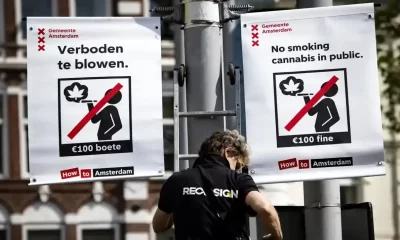Business
The Netherlands To Crack Down on Nitrous Oxide Gas

Whip-its aka laughing gas aka nitrous oxide is no longer on the menu for partygoers in The Netherlands.
Fed up with party companies renting out tanks of nitrous oxide and providing balloons and other equipment, leaders in The Netherlands are taking action.
The high provided by nitrous oxide—aka laughing gas or whip-its—will no longer be tolerated in The Netherlands under a bill proposed recently. Until recently, Dutch party hosts could call up a laughing gas company and rent equipment as if it were renting a photo booth.
In a November 14 briefing to MPs, Dutch Health Minister Bruno Bruins is leading a bill that would compel retailers and wholesalers to invoke a voluntary age limit for the sale of nitrous oxide canisters (whip-its), and to limit the number of canisters people can buy.
“The recreational use of laughing gas leads to enormous health risks,” State Secretary Van Ooijen (VWS) said in the briefing, translated on Google. “In addition, the safety of non-users is also at stake. We have seen enough reports in the news that terrible accidents have happened due to road users using laughing gas. In recent years, there has been a call from society to ban the recreational use of laughing gas. I am pleased that we can bring this ban into effect from January 1, 2023.”
Last June, The Volkskrant reported that dozens of companies have come out of the woodwork in The Netherlands selling and delivering laughing gas as a party drug—reportedly with names like Partygas and Lachgas Express. The companies provide the gas tanks as well as the balloons which are used to store hits of gas.
“The nitrous oxide ban helps the police enormously in enforcement. With the ban, having nitrous oxide with you—possession—in itself becomes a criminal offense,” said Minister Yeşilgöz-Zegerius (JenV), as translated from Google. “This allows the police to act sooner. Now that is only possible when someone uses laughing gas and causes nuisance or dangerous situations in traffic. With the ban, the police will soon be able to take immediate action if someone possesses non-professional laughing gas and has balloons with gas bottles in the car. Hopefully we can prevent accidents this way.”
Nitrous Oxide for Recreational Purposes
Get a load of this: according to High Times writer Nico Escondido, High Times founder Thomas King Forçade conceived the idea for the top pot magazine with a group of friends over a tank of nitrous oxide. As Amsterdam was the birthplace of Cannabis Cup, it’s likely those tanks were present at early events.
But leaders hope the move will make roads in The Netherlands safer. According to road safety monitor TeamAlert, laughing gas has played a role in 1,800 accidents across The Netherlands over the past three years. “Almost two a day, figures that really shocked us,” Maartje Oosterink of TeamAlert told AD newspaper earlier this month.
The dangers are legitimate for the ignorant. Unlike weed, too much nitrous oxide can actually kill you.
People who use nitrous oxide intended for technical purposes and intended as a food additive are exempt from the ban. However, the purchase, sale, possession, and handing of nitrous oxide in gas cylinders to private individuals will be prohibited beginning on January 1, 2023.
Manufacturers and wholesalers of medical nitrous oxide in The Netherlands must apply for an opium exemption on the basis of Articles 6 and 8 of the Opium Act. The small ampoules of nitrous oxide commonly used in the catering industry for whipped cream remain permitted, but may not be resold to third parties.
In the coming weeks, the final details of the ban will be ironed out.
Source: https://hightimes.com/news/the-netherlands-to-crack-down-on-nitrous-oxide-gas/
Business
New Mexico cannabis operator fined, loses license for alleged BioTrack fraud

New Mexico regulators fined a cannabis operator nearly $300,000 and revoked its license after the company allegedly created fake reports in the state’s traceability software.
The New Mexico Cannabis Control Division (CCD) accused marijuana manufacturer and retailer Golden Roots of 11 violations, according to Albuquerque Business First.
Golden Roots operates the The Cannabis Revolution Dispensary.
The majority of the violations are related to the Albuquerque company’s improper use of BioTrack, which has been New Mexico’s track-and-trace vendor since 2015.
The CCD alleges Golden Roots reported marijuana production only two months after it had received its vertically integrated license, according to Albuquerque Business First.
Because cannabis takes longer than two months to be cultivated, the CCD was suspicious of the report.
After inspecting the company’s premises, the CCD alleged Golden Roots reported cultivation, transportation and sales in BioTrack but wasn’t able to provide officers who inspected the site evidence that the operator was cultivating cannabis.
In April, the CCD revoked Golden Roots’ license and issued a $10,000 fine, according to the news outlet.
The company requested a hearing, which the regulator scheduled for Sept. 1.
At the hearing, the CCD testified that the company’s dried-cannabis weights in BioTrack were suspicious because they didn’t seem to accurately reflect how much weight marijuana loses as it dries.
Company employees also poorly accounted for why they were making adjustments in the system of up to 24 pounds of cannabis, making comments such as “bad” or “mistake” in the software, Albuquerque Business First reported.
Golden Roots was fined $298,972.05 – the amount regulators allege the company made selling products that weren’t properly accounted for in BioTrack.
The CCD has been cracking down on cannabis operators accused of selling products procured from out-of-state or not grown legally:
- Regulators alleged in August that Albuquerque dispensary Sawmill Sweet Leaf sold out-of-state products and didn’t have a license for extraction.
- Paradise Exotics Distro lost its license in July after regulators alleged the company sold products made in California.
Golden Roots was the first alleged rulebreaker in New Mexico to be asked to pay a large fine.
Source: https://mjbizdaily.com/new-mexico-cannabis-operator-fined-loses-license-for-alleged-biotrack-fraud/
Business
Marijuana companies suing US attorney general in federal prohibition challenge

Four marijuana companies, including a multistate operator, have filed a lawsuit against U.S. Attorney General Merrick Garland in which they allege the federal MJ prohibition under the Controlled Substances Act is no longer constitutional.
According to the complaint, filed Thursday in U.S. District Court in Massachusetts, retailer Canna Provisions, Treevit delivery service CEO Gyasi Sellers, cultivator Wiseacre Farm and MSO Verano Holdings Corp. are all harmed by “the federal government’s unconstitutional ban on cultivating, manufacturing, distributing, or possessing intrastate marijuana.”
Verano is headquartered in Chicago but has operations in Massachusetts; the other three operators are based in Massachusetts.
The lawsuit seeks a ruling that the “Controlled Substances Act is unconstitutional as applied to the intrastate cultivation, manufacture, possession, and distribution of marijuana pursuant to state law.”
The companies want the case to go before the U.S. Supreme Court.
They hired prominent law firm Boies Schiller Flexner to represent them.
The New York-based firm’s principal is David Boies, whose former clients include Microsoft, former presidential candidate Al Gore and Elizabeth Holmes’ disgraced startup Theranos.
Similar challenges to the federal Controlled Substances Act (CSA) have failed.
One such challenge led to a landmark Supreme Court decision in 2005.
In Gonzalez vs. Raich, the highest court in the United States ruled in a 6-3 decision that the commerce clause of the U.S. Constitution gave Congress the power to outlaw marijuana federally, even though state laws allow the cultivation and sale of cannabis.
In the 18 years since that ruling, 23 states and the District of Columbia have legalized adult-use marijuana and the federal government has allowed a multibillion-dollar cannabis industry to thrive.
Since both Congress and the U.S. Department of Justice, currently headed by Garland, have declined to intervene in state-licensed marijuana markets, the key facts that led to the Supreme Court’s 2005 ruling “no longer apply,” Boies said in a statement Thursday.
“The Supreme Court has since made clear that the federal government lacks the authority to regulate purely intrastate commerce,” Boies said.
“Moreover, the facts on which those precedents are based are no longer true.”
Verano President Darren Weiss said in a statement the company is “prepared to bring this case all the way to the Supreme Court in order to align federal law with how Congress has acted for years.”
While the Biden administration’s push to reschedule marijuana would help solve marijuana operators’ federal tax woes, neither rescheduling nor modest Congressional reforms such as the SAFER Banking Act “solve the fundamental issue,” Weiss added.
“The application of the CSA to lawful state-run cannabis business is an unconstitutional overreach on state sovereignty that has led to decades of harm, failed businesses, lost jobs, and unsafe working conditions.”
Business
Alabama to make another attempt Dec. 1 to award medical cannabis licenses

Alabama regulators are targeting Dec. 1 to award the first batch of medical cannabis business licenses after the agency’s first two attempts were scrapped because of scoring errors and litigation.
The first licenses will be awarded to individual cultivators, delivery providers, processors, dispensaries and state testing labs, according to the Alabama Medical Cannabis Commission (AMCC).
Then, on Dec. 12, the AMCC will award licenses for vertically integrated operations, a designation set primarily for multistate operators.
Licenses are expected to be handed out 28 days after they have been awarded, so MMJ production could begin in early January, according to the Alabama Daily News.
That means MMJ products could be available for patients around early March, an AMCC spokesperson told the media outlet.
Regulators initially awarded 21 business licenses in June, only to void them after applicants alleged inconsistencies with how the applications were scored.
Then, in August, the state awarded 24 different licenses – 19 went to June recipients – only to reverse themselves again and scratch those licenses after spurned applicants filed lawsuits.
A state judge dismissed a lawsuit filed by Chicago-based MSO Verano Holdings Corp., but another lawsuit is pending.
Source: https://mjbizdaily.com/alabama-plans-to-award-medical-cannabis-licenses-dec-1/
-

 Business2 years ago
Business2 years agoPot Odor Does Not Justify Probable Cause for Vehicle Searches, Minnesota Court Affirms
-

 Business2 years ago
Business2 years agoNew Mexico cannabis operator fined, loses license for alleged BioTrack fraud
-

 Business2 years ago
Business2 years agoAlabama to make another attempt Dec. 1 to award medical cannabis licenses
-

 Business2 years ago
Business2 years agoWashington State Pays Out $9.4 Million in Refunds Relating to Drug Convictions
-

 Business2 years ago
Business2 years agoMarijuana companies suing US attorney general in federal prohibition challenge
-

 Business2 years ago
Business2 years agoLegal Marijuana Handed A Nothing Burger From NY State
-

 Business2 years ago
Business2 years agoCan Cannabis Help Seasonal Depression
-

 Blogs2 years ago
Blogs2 years agoCannabis Art Is Flourishing On Etsy











